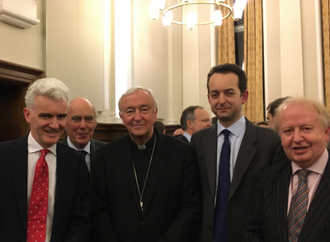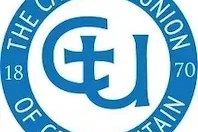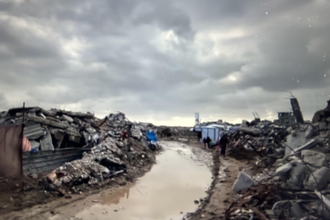Cardinal Nichols celebrates inaugural Mass for Catholic Union at Farm Street Church

l-r: Davids O'Mahoney, Mike Henderson, Cardinal Vincent Nichols, Richard Collyer-Hamlyn, Nigel Parker
Cardinal Vincent Nichols was chief celebrant and preacher at Mass for the Catholic Union at the Church of the Immaculate Conception, Farm Street, Mayfair last night. In his homily the Cardinal spoke about the role of the Catholic Union - to "champion the spiritual, moral and social teachings of the Catholic Church in the public sphere.' Reflecting on the Mass readings he reminded those present that we are: "on the one hand thoroughly of this earth and yet on the other hand within us is the breath of God." We must always remember, he said, in our work not to proclaim ourselves but only the person of Jesus.
After the Mass there was a packed reception in the Farm Street parish hall.
Read the full text of Cardinal Nichols' homily here:
"Welcome to this occasion to celebrate this Mass with the Catholic Union and to ask God's blessing on its work. A very simple expression of that role of the Catholic Union is to 'champion the spiritual, moral and social teachings of the Catholic Church in the public sphere. So I thank God for all who have served this cause through the Catholic Union over many many years. There are many in my mind who I first met when I was appointed as Ecclesiastical Advisor to the Catholic Union in 1984. I must admit that I received more advice than I ever got a chance to give.
Do you know, the readings that we've heard this evening do cast a real light on that purpose - 'to champion the spiritual, moral and social teachings of the Catholic Church in the public sphere.'
St Paul in characteristic way uses words with great economy and in that short first paragraph of the reading he tells us three crucial truths, points, about the task that we have been given. He describes for us the inscrutable message of God in Christ. So, that reassures us that unfolding the gift of Christ in any age, certainly in our age, is no easy task. We shouldn't expect too ready a hearing, too immediate a response . It is something inscrutable. that takes wondering and slowly reveals its fragrance and its beauty.
The next phrase that St Paul uses tells us a little bit about why that is so, because he says this is the mystery hidden from all ages and in that phrase I think he captures what we sometimes perceive - that there is a deep-seated yearning in the human heart to which Christ is God's fullest response. But its deep, its hidden. Its as it were written into the very origins and structure of our human nature. And its easily covered over with layer and layer and layer of lesser and other preoccupations.
And then at the end of this sentence he tells us that all of this is the design of God the Creator.
Now taking those three things together I think he reminds us that there are two fundamental principals about how we go about championing the teachings of the Catholic Church in the public sphere, proclaiming the name of Jesus.
The first is - we have to go back to basics - not to use a phrase that is particularly in current use but was once. And to do that I would like to speak for a moment about the figure of Adam. You can't get more basic than the figure of Adam in the Book of Genesis. for pointing out to us the fundamental truths of our human nature. There are two things about that. One - he is the only part of creation that is made by God's hands. and God uses as his basic material the dust of the earth. So the first thing about our human nature is that we are dust. We belong to the ground as it were are rooted in this world and yet we're shaped by God's hands. And the second thing we learn about Adam in the Book of Genesis is that God breathed into him and gave him life. And that in a nutshell is our human dilemma. Our human drama. That we are on the one hand thoroughly of this earth and yet on the other hand within us is the breath of God.
Which is a breath of eternal life. Which a breath of absolute fulfilment and satisfaction. And we live that drama day by day. And when we go back to these places its so important that we never forget that we never forget in particular that this dust of the earth contains and is enlivened by the breath of God. And of course when that second truth is forgotten, then people view each other as no more than dust. therefore at times a nuisance therefore at times to be got rid of therefore at times to be brushed to one side. . But when we remember that there is within us the breath of God, then we remember the dignity, the value of every person from the moment of conception to the moment of death.
The second thing that we learn from St Paul - he teaches us to go back to the Creator. The second thing we learn is his posture, And his posture is that of kneeling before the Father . And that too we must remember always. … that in our work we are never ever proclaiming ourselves. never putting ourselves forward as the answer, the resolution. Only the person of Jesus.
We are living in a time when it is perfectly evident that if we as members of the Church .. I as a bishop - put my myself forward then I'm asking for trouble, because the way in which evil and a particular evil - that abuse of children finds a lodging in the Church should indeed keep us always on our knees and conscious of what it is we wish to proclaim and its never ourselves and our own grandeur. Kneeling before the Father Paul receives .. and spirit which is our main guide and our way forward.
This time and this year 2019 we are approaching the 190th anniversary of the Catholic Relief Act. the act by which Catholics in this country could again take up public life and public office. It was a difficult step to be achieved. It caused a great deal of controversy It was 50 years on the fashioning before before the Act was given Royal Assent. and somewhat ironically during the 50 years were tied up with the Irish question - you could say the Irish backstop. Its not a new issue for us. But that Act led to the flourishing of Catholic life and the flowering of Catholic life in service to our wider society. in the fields of politics and governance. In the field of education - for today 800,000 pupils are education every day in our Catholic schools. In the field of medicine - doctors nurses hospital staff. In that astonishing array of Catholic charities that outreach to those in need in so many different ways both at home and abroad… In the Catholic contribution to cultural life - art, music, literature, and sport.. And always we remember that the deepest joy and motivation in all of this is knowing that we do these things in the service of Christ.
Now finally if I may just return back to St Paul. What he learns on his knees what he prays for on his knees is that sense of being a family whose life flows from God and will return to God. Now we know that families live through tensions. They live through conflict they live through difficult periods. And I think its clear that the family of our society is doing that. So our part is to stand always for the fundamental unity within the family of this nation. Rooted in the divine breath shred by every person. and thats the true motivation of our service .. and the inspiration behind the work of the Catholic Union of Great Britain for which we thank God this evening and ask for God's blessing. Amen."
Founded in 1870, the Catholic Union, is the leading lay organisation in Great Britain, represent the interests of the Catholic community. St Thomas More is the Union's patron. The Catholic Union enjoys consultative status to the Catholic Bishops' Conference of England and Wales. It influences the changing nature of the parliamentary world where the Government itself relies on the recommendations of expert Commissions, which in turn take public or invited evidence and advice.
The Union also seeks to uphold a Christian standpoint in public life through educational activities, representations to Parliament, Government bodies and the media.
Much of the detail at the Committee stage of legislation is thus open to outside amendment with consensus rather than confrontation. With wide expertise in different disciplines, the Union has been able to make effective criticisms and representations to Government in many areas.
It has specialists on the Parliamentary and Public Affairs Committee and also has representatives in the field of bioethics with the Catholic Medical Association with whom it has a Joint Medical Ethics Committee.
The Union is guided by its Catholic principles, and seeks to follow closely the spirit of 'The Participation of Catholics in Political Life' , a document issued by the CDF (2002), which articulates the duties of the laity and their participation in public life.
The Catholic Union hold a number of gatherings, public lectures and other events throughout the year.
For more information, or if you would like to join the Catholic Union, see: www.catholicunion.org.uk


















